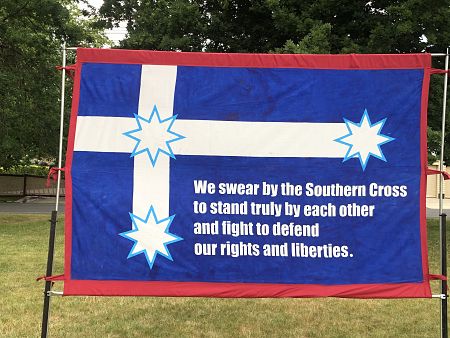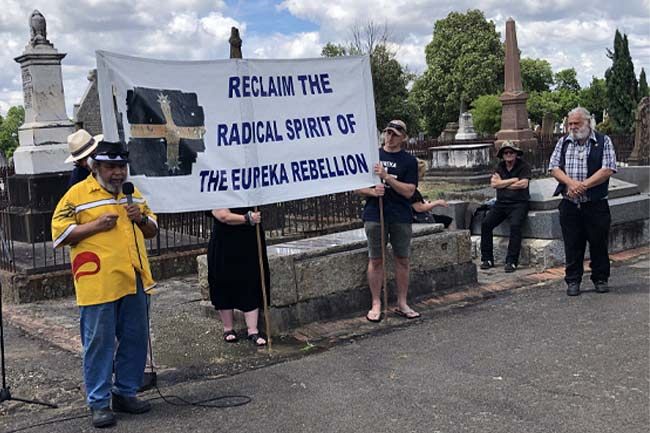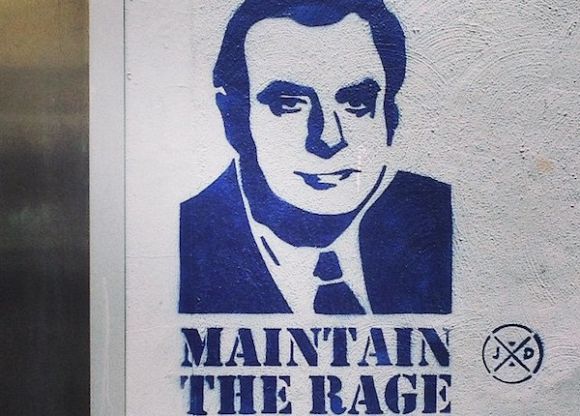Many democratic liberties we celebrate today are the result of the sacrifice of the rebels who fought for freedom 170 years ago, writes Dr John Jiggens.
AT FOUR in the morning, Ballarat was dark and dismal. Nonetheless, about 40 people, suitably dressed for the cold and the light drizzle, assembled at the Eureka Stockade Memorial Park to commemorate the 170th anniversary of the 1854 Eureka Rebellion.
The sky was clouded and the Southern Cross was shrouded, but it was abundant on the flags, banners and clothing. The flag we should have had! The symbol of an independent Australia.
Of the banners, my favourite was a large flag by master banner-maker Graeme Dunstan, with the iconic Cross cropped and bordered in red.
The Eureka Oath, the declaration of solidarity by the rebels, is written like a poem across the lower half of the banner:
We swear by the Southern Cross
to stand truly by each other
and fight to defend
our rights and liberties.

In 1854, Ballarat was a clutter of tents and miners’ claims that stretched across the plain, a massive tent city of 25,000 men, women and children from all corners of the world seeking their fortune in the gold fields of Victoria.
The Ballarat Reform League was formed on 11 November 1854 when 10,000 diggers voted for the League’s charter, opposing the miner’s licence that the Victorian Government was seeking to impose. The League supported the demands for reforming the Victorian Parliament, which was controlled by the squatters, with a government based on universal male suffrage and they supported the democratic aims of the UK chartists.
The Chartist demands are the liberties we enjoy today – the right to vote, the right for working people to stand for parliament, the secret ballot, the right for people to have a say in the laws that govern them – but in the UK, these demands were met with soldiers and bullets. To the Victorian Government of 1854, these demands were outrageously dangerous.
The diggers dreamed of creating in this new land a world free of the class divisions of the old world. The Eureka Oath that the members of the League swore reflected the view of the U.S. revolutionaries that they were born with inalienable rights and liberties. They opposed taxation without representation like the Americans and chose the Southern Cross as the symbol of their desire for freedom.
The Eureka Stockade Memorial Park where the commemoration was held was the site where the Eureka Stockade once stood. The memorial was held at 4 A.M. because that was the hour when, 170 years ago, the redcoats and the Victorian police galloped out of the darkness on Sunday 3 December 1854 in a dawn raid to suppress the League with bullets and swords. Only 104 miners were in the Stockade that Sunday because many of them believed that the state would not attack on God's day.
Outnumbered, the diggers were quickly overcome. Twenty-three of the miners who had sworn the oath to defend their rights and liberties died that day. As in the UK, the demands for democratic reform were answered with bullets. Of the surviving rebels, 13 were charged with high treason, a crime whose hideous punishment was to be hung, drawn and quartered.
In front of the steps leading up to the Eureka memorial, beside a banner that read ‘Reclaim the radical spirit of the Eureka Rebellion’, Dr Joe Toscano opened the Eureka Stockade commemoration, declaring:
“We're here to reclaim the radical spirit. There may be people here who are descendants of people involved in the rebellion, both the soldiers and the police and there may be people here for historical reasons. There may be people who are just into reenactments, but we're here to reclaim that radical spirit that's been sanitised, written out of the history books and become part of this country's forgotten history.”
Toscano is a veteran 3CR broadcaster who has been involved in the commemoration celebration of Eureka for 22 years. His colleagues at 3CR sent a team to broadcast the Eureka dawn ceremony to Melbourne, Australia and the world.
Dr Toscano said:
“I feel shame every time I come into this city and I feel shame because of the lack of respect that's shown on 3 December by this city's institutions who use the Ballarat League’s symbol to promote their institutions and business, but really, do very little to highlight the event.”
The authorities in Ballarat, Victoria and Australia have always been uneasy with the implications of the Eureka rebellion. History shows long periods when the significance of the Eureka Stockade was shunned and forgotten for many years, even in Ballarat.
The story of Eureka remains heavily contested.
The dawn service was the first of several events held on the anniversary of Eureka, including the awarding of Eureka medals to grassroots community activists, a visit to the mass grave of the rebels in Ballarat’s Old Cemetery, followed by a visit to the Eureka Centre, which houses the original Eureka flag for a lecture on the origins of the historic flag.
The visit to the Old Cemetery to see the mass grave of the slaughtered diggers was deeply moving.
Two days after the rebellion, when the bodies of the slain were beginning to smell and rot in the Stockade, the military decided that they would bury the rebels in a mass grave. Soldiers with bayonets drawn lined the path from the Eureka Stockade to the graveyard. The cart transporting the corpses was followed by 200 miners who witnessed the bodies of their 23 comrades unceremoniously disposed of in a mass grave.
The 13 men who were tried for high treason were found not guilty by a jury of their peers in 1855, showing the widespread outrage at the massacre. In 1856, a monument to the fallen diggers was presented to the people of Ballarat by the people of Geelong.
It was dedicated to:
‘...those who fell on the memorable 3 December 1854 in resisting the unconstitutional proceedings of the Victorian Government. This monument was presented by James Leggatt, Geelong to the people of Ballarat...’
The key phrase is ‘the unconstitutional proceedings of the Victorian Government’.
The contested history of Eureka is chiselled into the stone of Ballarat’s Old Cemetary monuments.
A short walk from the rebels’ mass grave is the monument to the five soldiers who died during the assault. Erected by the authorities some decades later, the inscription on this monument presents the official story, twisting the narrative to keep the Union Jack ascendant over the Southern Cross.
It is dedicated to the British soldiers:
‘...who fell dead or fatally wounded at the Eureka Stockade in brave devotion to duty on Sunday 3 December 1854 whilst attacking a band of aggrieved diggers in arms against what they regarded as a tyrannous administration.’
The monument acknowledges that the remains of the locals the British soldiers slaughtered were buried nearby and tries to placate the ‘aggrieved’ locals, declaring:
‘...the diggers who fell in their courageous but misguided endeavours to secure their freedom which soon afterwards came in the form of manhood suffrage and constitutional government.’
The sacrifice of the diggers of Eureka forced the establishment of universal male suffrage in Victoria, a reformed parliament and later, the eight-hour day, major advancements in democracy in which Victoria led the world. These reforms were not conceded by a benevolent government. They were paid for in the blood of the Eureka diggers.
(The commemoration of the Eureka Stockade is held every 3 December by Reclaim the Radical Spirit of the Eureka Rebellion Ballarat. Put it on your bucket list!)
Dr John Jiggens is a writer and journalist currently working in the community newsroom at Bay-FM in Byron Bay.
 This work is licensed under a Creative Commons Attribution-NonCommercial-NoDerivs 3.0 Australia License
This work is licensed under a Creative Commons Attribution-NonCommercial-NoDerivs 3.0 Australia License
Support independent journalism Subscribe to IA.














